|
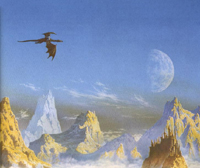
The adult dragon is astute and powerful and sure of its strength. Its cunning helps it elude the ingenious traps laid by man with a spirit that could be described as sporting. The dragon is usually avaricious and fairly insolent, which is only to be expected given its power and considerable physical strength.
Dragons are very fond of jewels and precious stones, and they hoard treasure greedily. Perfect connoisseurs, they are discerning in their appreciation of gems, and it is not easy to deceive them as to a stone's value. They are lovers of conundrums, and often promise to set their victims free on condition that they find the answer to a riddle.
They are usually very proud and have an acute sense of ridicule. Nothing infuriates them more than being made fun of by humans. This is something we have to bear in mind when dealing with a dragon. If we embarrass a dragon, it will retreat to its hideout in shame and will refuse to have anything to do with us. But if we speak to them circumspectly, and show that we are capable of keeping their secrets, we will gain their confidence and achieve great influence over them.
Dragons live in a complex society that reflects their great intelligence and strong sense of justice. Their social order is determined entirely by age and size, the oldest and wisest among them being of the highest social rank. Such old and venerated dragons are called pendragons, and their opinions carry great authority. Dragons of either sex can be pendragons; there is no sexual discrimination in this matter. 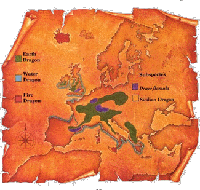
Periodically, all the adults of each dragon dominion gather at traditional meeting places, usually large craters, to meet and discuss current issues and to revise the Draconian Code. These periodic assemblages, or dragon senates, are times when matters of great concern are dealt with. In recent years, as the dragon population has become extremely low, it has rarely been possible for the dragons to meet formally in such senates.
As a result, many of the younger dragons are losing interest in traditional methods of discussing and settling matters of general draconian interest. There has thus been a decreasing respect for the basic principles of dragon culture, and an increasing amount of wanton destruction of property and unprovoked attacks on humans. Naturally, such renegade dragons have been punished appropriately, when possible, by being placed in solitary confinement for two centuries or more on small, remote tropical islands, with no visiting privileges. This is bitter punishment indeed, for dragons are highly intellectual creatures and tend to pine away when separated from all aspects of dragon culture.
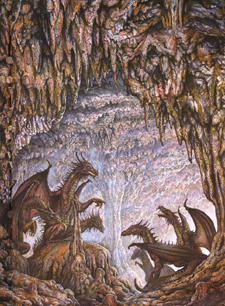
The various dragon families are organized into hierarchical societies revolving around the figure of a wise and judicious male, the head of the family known as the Dragon Father. All the other dragons pledge obedience to him. It is his task to make peace and adjudicate when there are family quarrels or territorial disputes, which sometimes arise, and to confer a true name on each of his subjects. The true name of a dragon is a synthesis of his personality and his history. It expresses his origin it is important to note that dragon ancestry is transmitted via the father and also by all that the dragon has achieved during his life, his aspirations, his knowledge and his level of mastery of magic.
The Dragon Father usually confers his name on him at his birth, but it is modified throughout his life. The secret is guarded so jealously that a dragon's real name is known only to the dragon himself and to the Dragon Father. The dragon is very well versed in magic and knows the power associated with names. So important are they that the surest way to defeat and subdue him is to discover his name, which he keeps a closely guarded secret. The dragon also has one or several assumed names by which he is known, but only his secret name gives others power over him.
The Dragon Father usually exercises his privileges with moderation. His court is made up of an unspecified number of young dragons that act as bodyguards and pages to the King, and young virgin female dragons that have not reached the required maturity to mate. It is the Dragon Father who decides when the females are ready for mating. He is assisted by the elderly female dragons, which are no longer fertile and have withdrawn, tired of wandering the world. These females, who are very well versed in magic, are given the title of Queen and hold full authority in the Regency Council. They select the candidates for the nuptial flight. It is they who choose the successor to the Dragon Father on his death.
Because dragons' dens are hidden in remote places, and because these are very dangerous to enter, no one has been able to observe the Western Dragon's family structure. And although books tell us many facts about dragons, they usually refer to male dragons, as though females weren't important. Perhaps the females were forced to remain hidden, busy bearing and rearing babies.
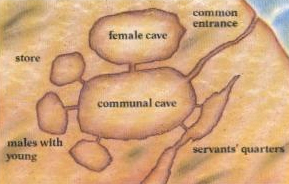
As we enter the spacious cave complex, which is the earth dragon's abode, we first come across a crudely excavated entrance cave, with a narrow corridor with very highly polished walls leading to the inner cave. The bedroom, where the treasure, which serves as his bed, is carefully arranged, is usually the central cave. This room, considered as the royal apartment, is always kept clean and tidy and is often adorned with beautiful and rare objects, tastefully arranged by the servants. These include luminous mosses and strangely shaped roots and stones, sculptures and artifacts of gold and silver work the spoils from the dragon's looting. Behind this room are the slaves' quarters as well as a cave, which is much smaller than the royal apartment where the dragon's page sleeps.
The common belief that dragons are dirty and unkempt, and that their homes are full of food leftovers is groundless. Like all animals that live in caves and burrows, they like to keep their home clean and tidy. It is the slaves' job to carry out these domestic duties. The earth dragon's slaves are gnomes, elves and other woodland creatures, and above all human beings. The dragon himself captures some, and others are acquired through exchanges with other dragons. The servants' duties include cleaning and arranging the home, as well as brushing and cleaning their master's scales and keeping him company. They do not lead a wretched life, as might be expected, for their masters are not generally cruel to them, but treat them with kindness and generosity. The notion that dragons eat their servants when they are old and have outlived their usefulness is completely false. In fact this only happened on two occasions.
In both cases the dragons in question were very old and suffering from 'senile dementia', a brain-wasting disease which affects the members of this dragon family due to the enormous quantity of meat and fat they consume. More usually a friendship develops between the dragon and his slaves, and often the servants accompany their masters to the celebrations held every five years at the court of the Dragon Father. Remember that the dragon does not build up relationships with other members of his species very easily.
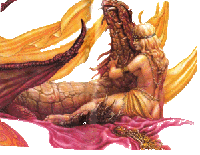
The dragon shows a preference for pretty young slaves with good singing voices, for the dragons' love of music is legendary. A human slave with these attributes can become the dragon's favorite, and he will sleep with his head in her soft lap and adorn her with jewels when he presents her at the court of the Dragon Father, who is very tolerant towards his subjects' whims.
Much has been written of dragons that have offered friendship to their servants. There are even instances of a profound and genuine affection seen between a dragon and a human being. Such is the story of Crisofilax, a dragon who signed a pact of friendship with King Egidius, and who lived for years in the capital of the King's tiny state. Similarly, the Cronicas de Los Nuevos Reinos (Chronicles of the New Kingdoms) tell of the case of Jilocasin, a dragon who, on losing his own young, adopted the first-born son of a lady. He brought the boy up and educated him like his own son, born of this same lady, and he succeeded in making both of them armed knights. The wise and judicious Jilocasin died defending his offspring against a female dragon who was jealous of the fame of the two young men, known as the Knights of the Dragon.
|

